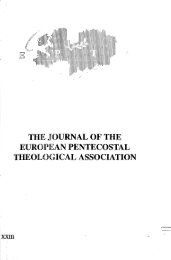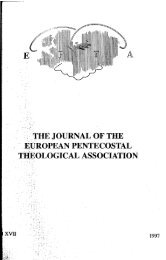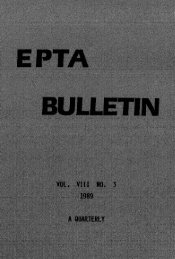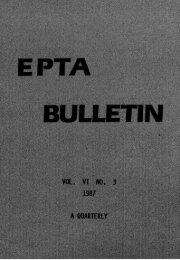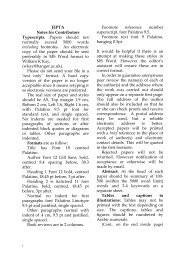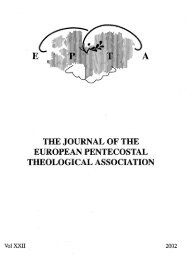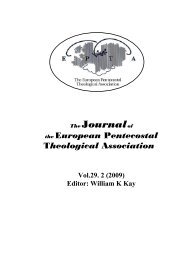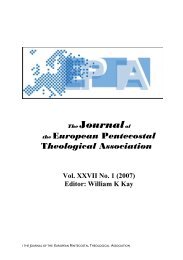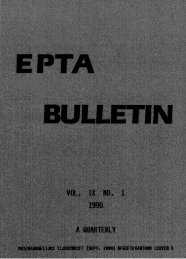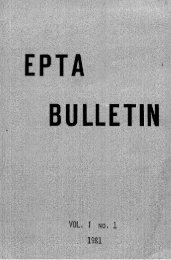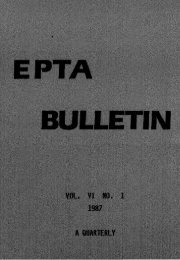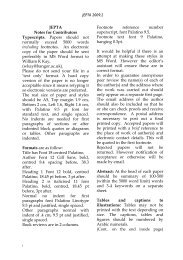jepta 2001 21 - European Pentecostal Theological Association
jepta 2001 21 - European Pentecostal Theological Association
jepta 2001 21 - European Pentecostal Theological Association
You also want an ePaper? Increase the reach of your titles
YUMPU automatically turns print PDFs into web optimized ePapers that Google loves.
The Journal of the <strong>European</strong> <strong>Pentecostal</strong> <strong>Theological</strong> <strong>Association</strong>, Vol. XXI, <strong>2001</strong><br />
Arthur Booth-Clibborn: <strong>Pentecostal</strong> Patriarch: James Robinson<br />
put on their mamage as well as the trauma of a recent miscarriage, she was chary<br />
of engaging with any cause outside her own personal control. On her ninetieth<br />
birthday, she confessed to her son Theo, "I am still a Salvationist at heart."'<br />
HIS CONTRIBUTION TO PENTECOSTALISM<br />
Arthur Booth-Clibborn made a major contribution to the early <strong>Pentecostal</strong><br />
movement by openly identifying himself with it. Of all the early leaders, he was<br />
the one with the highest public profile in British religious circles. His periods of<br />
illness meant that never again would he be the preaching force of his former days<br />
but, by his august and benevolent presence at public meetings and conferences,<br />
he encouraged the younger leaders and was a persuasive force in bringing a wider<br />
<strong>European</strong> dimension to the leadership of British <strong>Pentecostal</strong>ism. The Booth name<br />
lent some degree of respectability to a sorely pressed movement living with the<br />
obloquy of charges of fanaticism and Satanic deception. The high profile of the<br />
name was demonstrated in press opinion at the time of his dismissal from Zion.<br />
When Arthur's salary ceased and the financial burden of ten children and doctors'<br />
bills had to be faced2, the nationally circulated satirical magazine, John Bull,<br />
printed a cartoon showing a beefy John Bull character and an animated General<br />
Booth, with a football labelled "Mar chale" being vigorously booted by the<br />
General.' The cartoon had the effect at least of making the General and his eldest<br />
son, Bramwell, when on tour in France, anxious to avoid adverse publicity by<br />
refusing to visit the sorely pressed Booth-Clibboms, Such was the degree of<br />
family rupture that this was the last time Kate was to see of her father until she<br />
attended his deathbed seven years later. During the General's lying-in-state,<br />
150,000 filed past the coffin. On the day of the funeral, offices in the City closed<br />
and 40,000 lined the streets. Queen Mary was among those who attended the<br />
funeral service.<br />
It was through his influence on his own children and then in turn through their<br />
work in the movement that Arthur Booth-Clibborn made his most telling<br />
contribution to <strong>Pentecostal</strong> advance. With Kate frequently campaigning away<br />
from home, a situation made all the more necessary by the need to provide financial<br />
support for the family, he played a major role in the parenting of the<br />
children in their teenage years. In November 1908, while preparing for exams to<br />
enter Cambridge University, William, the fifth born of their ten children, was<br />
pressed by his father to attend a weekend of meetings in London which, as it<br />
I Carolyn Scott, op. cit.. 246<br />
' Catherine wrote in a memorial tribute of her late husband that he "never cared for money;<br />
indeed, not enough, for material burdens are very real when obligations are ever increasing.<br />
They must be carried by someone, and yet - and yet - if he was extreme on the one side, are not<br />
many of God's children extreme on the other" In their case, she was that "someone".<br />
(Catherine Booth-Clibborn, op. cit., viii)<br />
' Ibid., opposite page 150.<br />
turned out, stretched till the following Wednesday.' On the Saturday evening,<br />
father and son attended the small mission run by a young American couple, Harry<br />
and Margaret Cantel (1878-1926). Margaret Cantel's father was one of Dowie's<br />
elders at Zion City and her husband was overseer of Dowie's work in Britain<br />
from 1900 till his death from peritonitis in 1910. This paved the way for Booth-<br />
Clibbom to link up with the American couple. The Cantels' mission, which according<br />
to William, "looked very much like one of these small stores you see in<br />
some American towns": was his first experience of a <strong>Pentecostal</strong> meeting in a<br />
public hall. The following evening, at a home in Plumstead with fifty people<br />
present, William received his Spirit-baptism.<br />
The relish and the ecstasy of that blessing have<br />
never left me, and the only sorrow was when they<br />
helped me to my feet and I realised, oh! with such<br />
pain, that 1 could not be with my Beloved, that I<br />
must walk this vale of tears and sorrow ... Oh! I<br />
did want so to be with Jesus, I thought suffering<br />
and death would be nothing if only I could stay<br />
continually under the smile of his face forever,<br />
raptured to the throne of His Glory and never see<br />
this sinful earth any more.'<br />
This experience is expressed in tones of sensuous intimacy, or in Percy's phrase<br />
"sublimated eroti~ism",~ evocative more of a contemplative in the Catholic<br />
quietist tradition than in the gritty language of much evangelical discourse. In that<br />
tradition, sexuality provided imagery for communicating the sublime nature of a<br />
spiritual climax, a task that drove writers to the outer margins of metaphor: in St.<br />
Teresa's words, "one makes these comparisons because there are no (other)<br />
suitable ones".'<br />
I Edward Booth-Clibborn said of his father: "I am persuaded that if my dear father had not<br />
boldly taken me out of (boarding) school at this time, my experience would not have proved<br />
such an overwhelming initiation into the sphere and power of a Spirit-filled life" (Redemption<br />
Tidings, 5.6 (June 1929) 3).<br />
' Redemption Tidings, 5.4 (April 1929) 2.<br />
' Ibid.<br />
' Martyn Percy, Power and the Church: Ecclesiology in an Age of Transition, Cassell: London<br />
(1998) 141.<br />
' Filipe Fernandez-Amesto & Derek Wilson, Reformation: Christianiq and the World 1500-<br />
2000, Bantam Press: London (1996) 51. Any hint of effeteness concerning William is disabused<br />
by the picture drawn of him by Pastor Philip Duncan, leader of a sizeable <strong>Pentecostal</strong> church in<br />
Sydney when Booth-Clibborn visited Australia in 1930 (See Barry Chant, Heart of Fire; The<br />
Story of Australian <strong>Pentecostal</strong>ism, Luke Publications: South Australia (1973) 109-1 12.)<br />
William Booth-Clibborn urged the Sydney <strong>Pentecostal</strong> assemblies to combine under his<br />
leadership and thus present a united front. They proved not averse to the principle, just his<br />
high-handed approach to implementing it. Duncan was one of his protagonists, in every sense<br />
when Booth-Clibborn resorted to physically wrestling with him to assert his will!



